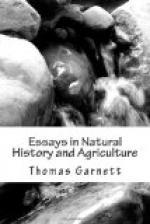I should be exceedingly obliged for any remarks your experience may suggest, and trust you will accept the cause which dictates my writing as a sufficient apology for troubling you on the subject.
I have had great pleasure in reading your able replies to Salmo Salar’s letters. On the appearance of the first, I was strongly prompted to reply to it myself, but rejoiced to find him in much better hands.
I remain, Sir,
Yours very truly,
WILLIAM AYRTON.
* * * * *
CLITHEROE, 4th February, 1854.
TO WM. AYRTON, ESQ.
DEAR SIR,—I am favoured with your letter of yesterday, and shall be glad to give you any information I may possess on the habits of Salmon, or the requirements of any act of Parliament necessary for the preservation and increase of this valuable fish. Being a mill-owner, I have interests which are supposed to clash with those of fish preservers; but I hope to be able to show that all mill-owners are able to give a passage over their weirs at all times when the fish are inclined to run; that is, when there are freshes in the river. I say this the more confidently, as I believe the works here are the largest in England for the power of the stream they stand upon, and I find it necessary to employ 150 horse-power of steam. Yet I find from a careful register, which has been kept here since the year 1838, that we are able, without interfering with the efficiency of the water power, to give the fish a passage over the weir 181 days, or part of days, annually, and this at times when alone they are disposed to avail themselves of such a passage—that is in floods.
The suggestions that occur to me from time to time I will not fail to send you. At present the following seem to me to be essential, to give efficacy to any Act of Parliament framed for the purpose of preserving and increasing the breed of Salmon, for without some such provisions the gentlemen on the upper parts of rivers will have no inducement to exert themselves in the matter.
First.—No nets or other engines, except rod and line, should be used for taking fish from six o’clock at night to six o’clock in the morning, and all fish should be allowed a free passage up the stream every night when this does not destroy or impair the efficacy of the water power.
Second.—No mill-owner nor his servants, nor any other person, should be allowed to take fish at his weir, or within fifty yards of it.
Third.—Conservators should be allowed to go into all wheel-races, wheel-houses and tail-goits, and also upon all lands on the banks of Salmon rivers, as well as inspect all cruives, weirs, &c., without being deemed guilty of trespass.
Fourth.—All weirs kept solely for fishing purposes, cruives, &c., should be compelled to give a free passage to the fish every night from six o’clock to six o’clock in the morning; and any obstruction placed in the gap calculated to hinder or frighten the fish back, should be deemed breaches of the Act of Parliament and liable to a penalty.




